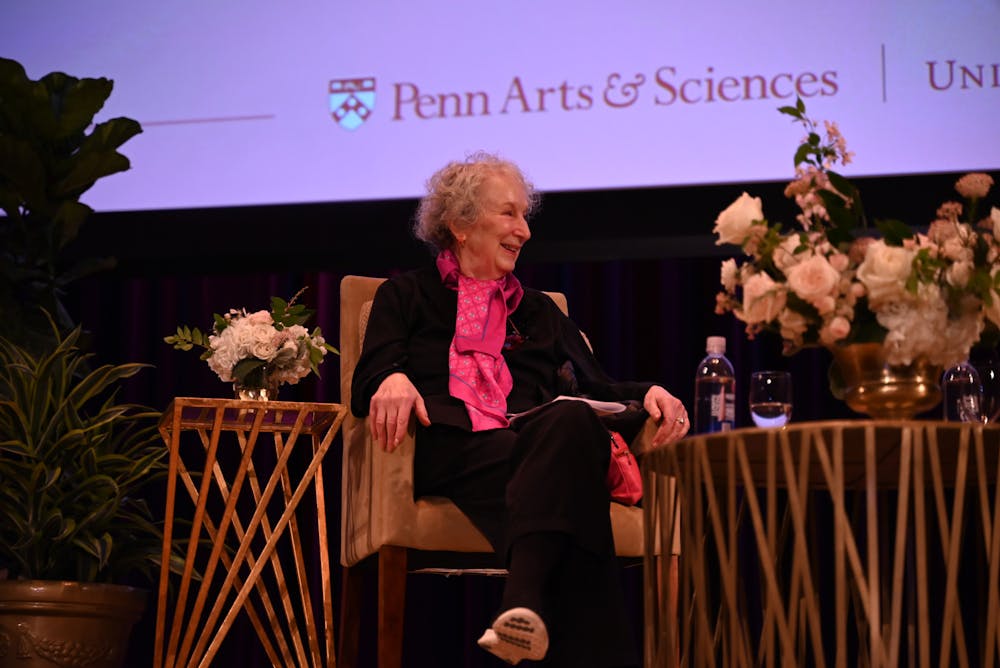Margaret Atwood is one of those writers whose name follows her legacy. At 84 years old, she collects titles and prizes in the literary world. An over–productive artist, she has published over fifty books—including books of poetry, novels, nonfiction, short fiction, children's books, and graphic novels. If her ability to dive into literary genres wasn't already proof of her multitude as a writer, Margaret Atwood is also a powerhouse at captivating an audience.
On Wednesday, April 17, Atwood sat with professor of classical studies Emily Wilson at the Irvine Auditorium to celebrate Penn Arts & Sciences students. Professor Wilson, with over two decades of teaching experience in ancient Greek and Roman literature, is renowned for her groundbreaking translations of Homer's Odyssey and Iliad. They start talking about how Atwood grew up in the woods of north Canada, where gender dynamics played a big part in her life. Reflecting on her upbringing, she recalls her mother—a departure from the conventional 1950s housewife stereotype—whose love for fishing and nature left a mark on Atwood's worldview: “When feminism arrived, I thought: Where have you been all my life?" Atwood said.
Gender struggles have not only been a personal crucible for Atwood but also a thematic cornerstone of her literary endeavors. Delving into the genesis of her work, Atwood discusses her reimagining of classical mythology in The Penelopiad. Atwood chose Penelope’s story because “as a teenager, I'd read the Odyssey all the time.” Drawing from her familiarity with Homer's Odyssey, she sheds light on the often–overlooked plight of Penelope and her handmaidens. “They were, as we now say, enslaved people. And they didn't have a choice. They were raped,” Atwood pointed out.
Atwood's artistic prowess lies in her ability to approach issues with both systematic scrutiny and creativity. Her most famous work, The Handmaid's Tale, stands as a testament to this blend of vision and insight. The novel is a futuristic dystopia set in a near–future New England in a patriarchal, totalitarian state known as the Republic of Gilead. Reflecting on its reception in 1985, Atwood recounts the different reactions across American audiences. "Americans split," she jokes. “On the one hand, we have, ‘Oh, Margaret, don't be silly. This is the world's greatest liberal democracy. We would never do such a thing.’ But out on the West Coast, we had quite a different reaction. And that was, ‘How long do we have?’”
Listening to a dystopian writer like Margaret Atwood in person often doesn't come with the expectation of hearing jokes. Yet, Atwood's humor is but a facet of her grounded realism. In her view, Gilead is not a far–fetched fabrication but rather a reflection of historical realities. "I'm not saying this will happen," she asserts. “I'm saying this is how it would happen.” Her writing is highly observational and structural. Similar to a science–related field, Atwood mentions how “language and storytelling are probably the oldest human technologies.” For Atwood, writing is intrinsically a scientific investigation—“literature has always been both direct record keeping and magic.”
When asked about her long and successful career, Atwood responds with her trademark humor: "First thing you have to do is live for a long time: Do the Mediterranean diet. Don't smoke." Seriously, this time, Atwood mentions how creative freedom is the key: “It helps to be ambidextrous. So if you get stuck on one thing, you can turn your attention to another.” She affirms the importance of artistic discipline: “Why do I write so many forms? Because nobody told me not to.”
Atwood's approach to the writing process is a delicate balance between research and personal experience. Refraining from giving weight to either aspect, Atwood likens her creative mind to "your grandmother's attic." "There's a lot of junk up there," she says, "but if you are looking for something, you know it will probably be there." She cautions writers against becoming overly consumed by research, as it can potentially bog down the creative flow and impede the momentum of the story.
Atwood is all too familiar with the topic of her books being banned. The Handmaid's Tale has faced censorship on numerous occasions, with bans imposed by entire countries like Portugal and Spain during authoritarian regimes, as well as by school boards and libraries across the United States. In a 2023 article in The Atlantic, Atwood writes: “What kind of a totalitarianism might the United States become?” I suggest we’re beginning to see the real–life answer to that query.” Her resilience shines through, as she refuses to be deterred by attempts to suppress her voice: "I would put up a big billboard that says 'Too Hot To Read,'" she jokes. Her humor shows her commitment to pushing boundaries through her writing. Despite the history of censorship, Atwood remains unchallenged, proving that her literary legacy is indeed "too hot to handle" for some.







